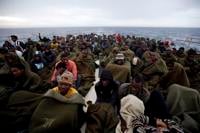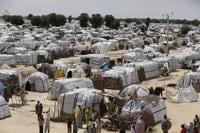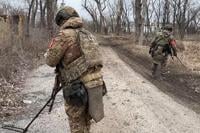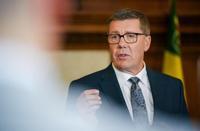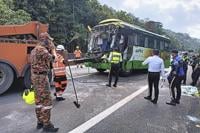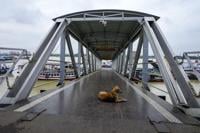BERLIN (AP) — More than a decade ago, the death of 600 migrants and refugees in two Mediterranean shipwrecks near Italian shores shocked the world and prompted the U.N. migration agency to start recording the number of people who died or went missing as they fled conflict, persecution or poverty to other countries.
Governments around the world have repeatedly pledged to save migrants' lives and fight smugglers while tightening borders. Yet 10 years on, a report by the International Organization for Migration's Missing Migrants Project published Tuesday shows the world is no safer for people on the move.
On the contrary, migrant deaths have soared.
Since tracking began in 2014, more than 63,000 have died or are missing and presumed dead, according to the Missing Migrants Project, with yet.
“The figures are quite alarming,” Jorge Galindo, a spokesperson at IOM's Global Data Institute, told The Associated Press. "We see that 10 years on, people continue to lose their lives in search of a better one.”
The report says the deaths are "likely only a fraction of the actual number of lives lost worldwide” because of the difficulty in obtaining and verifying information. For example, from Africa's west coast to Spain's Canary Islands, entire boats have reportedly vanished in what are known as “invisible shipwrecks.” Similarly, countless deaths in the Sahara desert are believed to go unreported.
Even when deaths are recorded, more than two-thirds of the victims remain unidentified. That can be due to lack of information and resources, or simply because identifying dead migrants is not considered a priority.
Experts have called the growing number of unidentified migrants around the world a crisis comparable to mass casualties seen in wartime.
Behind each nameless death is a family facing “the psychological, social, economic and legal impacts of unresolved disappearances,” a painful phenomenon known as “ambiguous loss,” the report says.
“Governments need to work together with civil society to make sure that the families that are left behind, not knowing the whereabouts of their loved ones, can have better access to the remains of people who have died,” Galindo said.
Of the victims whose nationalities were known to IOM, one in three died while fleeing countries in conflict.
Nearly 60% of the deaths recorded by the IOM in the last decade were related to drowning. The Mediterranean Sea is the world's largest migrant grave with more than 28,000 deaths recorded in the last decade. Thousands of drownings have also been recorded on the , in the , in the and increasingly in the and Andaman Sea where desperate .
“Search and rescue capacities to assist migrants at sea must be strengthened, in line with international law and the principle of humanity,” the report says.
Currently on the Mediterranean "the large majority of search and rescue is done by nongovernmental organizations,” Galindo said.
When the Missing Migrants Project began in 2014, European sentiment was more sympathetic to the plight of migrants, and the Italian government had launched “Mare Nostrum,” a major search-and-rescue mission that saved thousands of lives.
, and European search and rescue missions after fears that they would encourage smugglers to launch even more people on cheaper and deadlier boats. That's when NGOs stepped in.
Their help has not always been welcomed. In and , they have faced increasing bureaucratic and legal obstacles.
Following the 2015-2016 migration crisis, the European Union began outsourcing border control and sea rescues to North African countries to “save lives” while also keeping migrants from reaching European shores.
The have been criticized by human rights advocates, particularly the one with Libya. EU-trained and funded to human traffickers exploiting migrants who are intercepted and brought back to squalid detention centers. A U.N.-backed group of experts has found that the abuses committed against migrants on the Mediterranean and in Libya
Despite the rise of border walls and heightened surveillance worldwide, smugglers always seem to find lucrative alternatives, leading migrants and refugees on longer and more perilous routes.
“There’s an absence of safe migration options,” Galindo said. "And this needs to change.”
___
Brito reported from Barcelona, Spain.
___
Follow AP’s coverage of migration issues at


